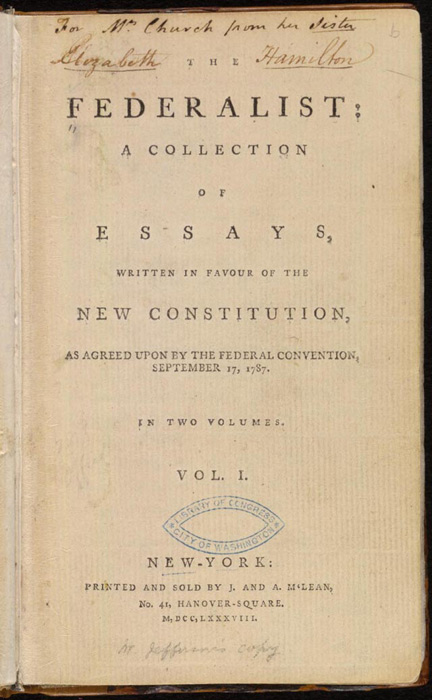Federalist Paper #2, authored by John Jay, continues the Federalist Papers series by emphasizing the importance of a strong federal union in a world filled with external and internal threats. Published in 1787 under the pseudonym "Publius," this essay addresses the dangers that the United States would face if it remained divided among several sovereign states. Jay's compelling arguments in this paper underscore the urgent need for a more centralized federal government.
Here are some relevant excerpts from Federalist Paper #2:
- The Dangers of Division: Jay highlights the vulnerability of a disunited America: "Providence has been pleased to give this one connected country to one united people – a people descended from the same ancestors, speaking the same language, professing the same religion, attached to the same principles of government, very similar in their manners and customs…"
Jay emphasizes that the people of the United States share a common heritage, culture, and language. This unity should serve as a foundation for a strong federal union, as it allows for shared values and a sense of collective identity.
- External Threats: The author stresses the potential threats that a divided nation might face from foreign powers: "With equal pleasure I have as often taken notice that Providence has been pleased to give this one connected country to one united people – a people descended from the same ancestors, speaking the same language, professing the same religion, attached to the same principles of government, very similar in their manners and customs."
Jay argues that a divided America would be vulnerable to foreign manipulation and aggression. A strong, united nation would be better equipped to defend itself and protect its interests.
- Dissension and Anarchy: The dangers of internal strife and discord are discussed: "The violent destruction of life and property incident to war, the continual effort and alarm attendant on a state of continual danger, will compel nations the most attached to liberty to resort for repose and security to institutions which have a tendency to destroy their civil and political rights."
Here, Jay warns that if the states fail to unite under a strong central government, the chaos and instability resulting from conflict and insecurity could lead to the erosion of civil and political rights.
The Importance of Federalist Paper #2
Federalist Paper #2 is a crucial contribution to the Federalist Papers series for several reasons:
National Unity: Jay underscores the significance of a united and cohesive nation, highlighting shared values, language, and culture as a foundation for a strong federal government.
External Threats: The paper reminds readers of the real-world dangers that a disunited America could face from foreign powers.
Domestic Stability: Jay's discussion of the potential for internal strife and the erosion of rights underscores the importance of a strong federal government in maintaining domestic stability.
Patriotic Appeal: The essay appeals to the patriotism of the American people, encouraging them to unite for the common good and the protection of their shared way of life.
Federalist Paper #2, authored by John Jay, effectively argues for the necessity of a strong federal union to safeguard the United States from both internal discord and external threats. This paper, along with the others in the Federalist Papers series, played a significant role in shaping the political landscape of the time and influencing the eventual ratification of the United States Constitution, which established the framework for the nation's government. Jay's persuasive arguments in this essay continue to resonate as a reminder of the importance of unity in maintaining a strong and stable nation.




No comments:
Post a Comment